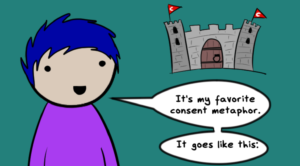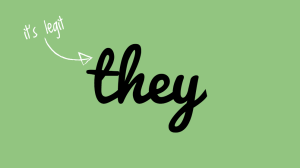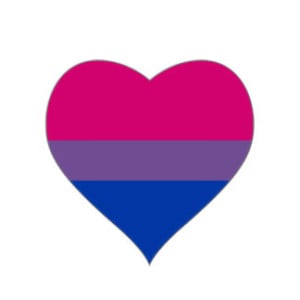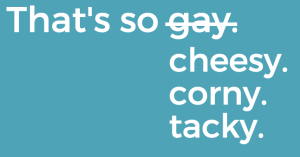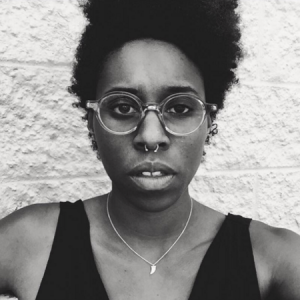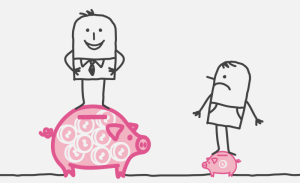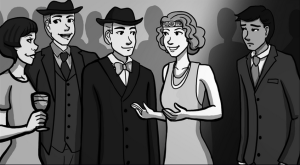
A person presses their hands against their temples, seemingly exasperated, while three people work on something – out of focus – in the background.
To the people who have “joked” that, as I’m Puerto Rican, I should give up my professional goals because I can “only mow lawns for a living.”
To the people who have “joked” that, as I’m Puerto Rican, my professional successes aren’t the product of my hard work, but “due to Affirmative Action.”
To the people who have “joked” using any kind of racist content.
And to the people who have laughed at racist “jokes.”
This letter is for you.
I need you to know that racist jokes are not funny.
And I need you to know that ironic racist jokes – jokes intended to demonstrate your awareness of ongoing racialized oppression – aren’t funny either.
This is a widespread sort of comedy, one we’ve been fed our whole lives. Many tell these jokes to ease the stress and exhaustion of (benefiting from) racism, and we encounter different people making similar jokes about their own communities.
So, what’s the big deal? It’s “just a joke,” right? Aren’t I being overly sensitive?
No, I’m not. These jokes are hurtful, regardless of your intentions.
And if you really want to be an ally to People of Color, they need to stop. Now. Here are five reasons why.
1. Racist Jokes Remind People of the Real-Life Oppression They Experience
Even if told ironically, racist humor reminds People of Color of the oppression that they encounter on a regular basis.
That is harmful.
That is triggering.
And it doesn’t matter if you, the joker, don’t aim to hurt me. That doesn’t mean that the joke isn’t hurtful nonetheless.
When my white friends tease me about Affirmative Action, for example, I know that they’re not saying that Latinx people can only advance through such means. I know that they’re saying the opposite. Through this ironic joke, they’re actually saying two things.
First, they’re signaling to me their awareness of a dominant discourse that suggests that People of Color unfairly benefit from public assistance, that some even consider Affirmative Action as “reverse racism.”
Second, they’re signaling to me their awareness of just how backwards that discourse really is. They’re signaling their awareness that “reverse racism” does not – cannot – exist. They’re signaling their awareness of ongoing structural racism that limits upward professional mobility among People of Color.
They’re signaling their awareness of my own hard work.
But here’s the thing, and this is really important: That still doesn’t matter. Because it still reminds me of the racist structures that my family and I have navigated our entire lives.
It brings back all of the times that I’ve confronted racism and all of the times that I was made to feel ashamed, less-than, dirty, inauthentic, weak, exotic, unwelcome, and dangerous because of my “otherness.”
These racist jokes only serve to intensify the self-doubt that I already experience because I, too, am aware of the fact that so many think that I have unnecessarily benefited from Affirmative Action.
Believe me, I don’t need the reminder.
And neither do people from other marginalized groups need reminding of their historical marginalization.
2. Racist Jokes Normalize and Destigmatize Racism
Racist jokes make me incredibly uncomfortable because they risk making racism a normal and destigmatized part of everyday life.
By making racist jokes, you downplay of a long history of oppression against People of Color.
When someone jokes that Puerto Ricans can “only mow lawns,” they minimize racialized structures of power that continue to economically, politically, and socially constrain Latinx communities.
But racism isn’t something that should be laughed at or made light of, because racism is not something that we should ever, ever, ever be comfortable with.
I understand that, particularly for allies, the white supremacist legacy of colonialism, slavery, and imperialism is uncomfortable.
Good. It should be. Nevertheless, white guilt is no excuse to trivialize racism at the expense of People of Color.
We need these conversations to happen in their fullness, which is not to say that there is no space for humor. You can use jokes both to help people process ongoing inequality and to get closer through exposing your own vulnerabilities.
However, these jokes don’t have to be – indeed, shouldn’t be – racist or oppressive.
3. Racist Jokes Assume that People of Color Are Not in the Space
Let me be blunt: Racist jokes reassert white supremacy.
They either assume that People of Color are not in the space. Or they actively disregard the People of Color with whom you share space.
Think of it this way: When you tell racist jokes, you’re privileging the perceived humor experienced by white listeners over the discomfort experienced by People of Color.
In other words, these jokes turn racist, essentialized categories into the butt of a joke for someone else’s enjoyment (because they’re certainly not for mine).
As I’ve said, when people have joked with me about my professional pursuits, it’s a painful reminder of my experiences and of the unjust journey that many other Latinxs and POC must negotiate.
But this joking also demonstrates what you, the joker, think (or don’t think) of me, the Puerto Rican, who’s right in front of you.
It acknowledges your willingness to disregard my discomfort in order to (re)create a platform for more dominant voices.
Now, I’ve heard the excuses: “Joking makes us all equal” and “I’m looking forward to the day when we can all just tease each other.”
But we need to remember that racist joking is about power.
Racist jokes don’t make us equal, particularly when the jokes themselves reinforce inequality.
As long as society remains racist – and it remains racist – these jokes don’t level any playing field. Instead, just like catcalling reasserts public space as male-space, racist jokes reassert public space as white space.
This is exclusionary to the People of Color who share the classrooms, break rooms, bathrooms, sidewalks, parks, stores, restaurants, and bars – not to mention the comedy clubs, television shows, and films – where these jokes occur.
4. Racist Jokes Silence People of Color
The pain and frustration that racist joking evokes, alongside the structures of power that it reinforces, silence People of Color. Because People of Color are still not allowed to frame the discussion around joking.
Because despite discussion after discussion affirming that racist jokes are hurtful and oppressive, the most common response remains, “Lighten up. It’s only a joke.”
Sure, to you it’s “only” a joke. But, to me it’s so much more.
What’s so frustrating, though, is when I ask white folks not to make that all too familiar “lawn mowing” joke, many don’t listen. They become defensive. At best, they dismiss my comments, saying that I’m overly sensitive or lacking a sense of humor.
At worst, they accuse me, as emblematic of political correctness gone array, of infringing upon their First Amendment right to free speech.
Or they’ll further derail the conversation by arguing that if Latinxs, for example, can joke among themselves about these themes, they should be able to as well.
However, this “all lives matter” argument, a reassertion of whiteness in spaces of color, fails to recognize – or validate – that joking among People of Color is not the same as racist joking.
It is not oppressive, rather, as it serves both to ease the pain of systematic inequality and to assert under-represented voices.
Not wanting to be reminded of a painful history of oppression through an act of white supremacy does not make me overly sensitive. It doesn’t mean that I don’t have a sense of humor. And it certainly doesn’t mean that I’m somehow oppressing you.
Rather, it’s racist joking that fails to recognize the voices and experiences of those negatively affected by the joking itself.
This puts me – and people from other historically marginalized communities – in a lose-lose position.
First, I could try to speak up (again), only to be silenced, to have my perspectives minimized by misguided accusations of my sensitivity, my missing funny bone or my attempts to supposedly restrict freedom of expression.
Second, I could just accept this ongoing racism… and silence myself.
5. Racist Jokes Put (Allies of) People of Color in the Uncomfortable Position of Having to Call You In or Out
Especially if you strive towards allyship, it would probably upset you to know that your racist jokes hurt and disappoint your friends and loved ones of color.
I know, I know, that the racist jokes that many of my friends have shared have been an attempt to demonstrate their solidarity with me as Latinx, and with People of Color more generally. I know that they don’t intend to be insensitive. They don’t intend to be racist.
But, that is no grounds for a free pass.
Good intentions don’t erase the harm that they’ve caused, the supremacy that they’ve reinforced.
So, if I choose not to silence myself, I’m put in the awkward position to have a discussion with my friends about their racism. And I do so knowing full well that it could dramatically alter our relationship.
And think about it, if you insist upon telling racist jokes, even ironically, you’re doing the same thing.
You’re either actively silencing your friends, relatives, acquaintances and colleagues of color – or, you are forcing them to sit you down and have an uncomfortable, embarrassing and potentially relationship-ending conversation.
That is not the kind of interaction I want to have with my friends.
And I know it’s not the kind of interaction you want to have with yours.
***
I am not a punch line, nor are the struggles of those from any oppressed community.
Racist jokes have never been funny!
They have never been funny to those who are the object of the jokes.
Complaining that political correctness, for example, is somehow making the world humorless completely misses the point. It fails to recognize the oppressive nature of the jokes themselves. It fails to recognize how racist jokes – intended to be amusing only to white audiences – reinforce white supremacy.
I have never laughed when people joked about the ongoing oppression of Latinx communities. Not only are these jokes not funny, they’re not even jokes at all, not to me.
I am not asking to make society less funny.
Instead, I am demanding that we reconsider what we mean by “funny” in the first place.
By validating the experiences and perspectives of People of Color, inclusive joking is about expanding humor and making it more accessible.
So, let’s rid racist jokes from our lexicons. That way we can make the world funnier for everyone.
[do_widget id=’text-101′]
Andrew Hernández is a Contributing Writer for Everyday Feminism. He is a public anthropologist and teacher, completing his PhD in cultural anthropology at the Graduate Center, City University of New York. Andrew bases his research out of West Africa and the Sahara, working on issues of human rights, crisis and religion. A former adjunct lecturer, he is now a Professional Teaching Fellow at the University of Auckland in New Zealand. You can follow him on Twitter @AndrewHernann or at his website www.AndrewHernann.com.
Search our 3000+ articles!
Read our articles about:
Our online racial justice training
Used by hundreds of universities, non-profits, and businesses.
Click to learn more





